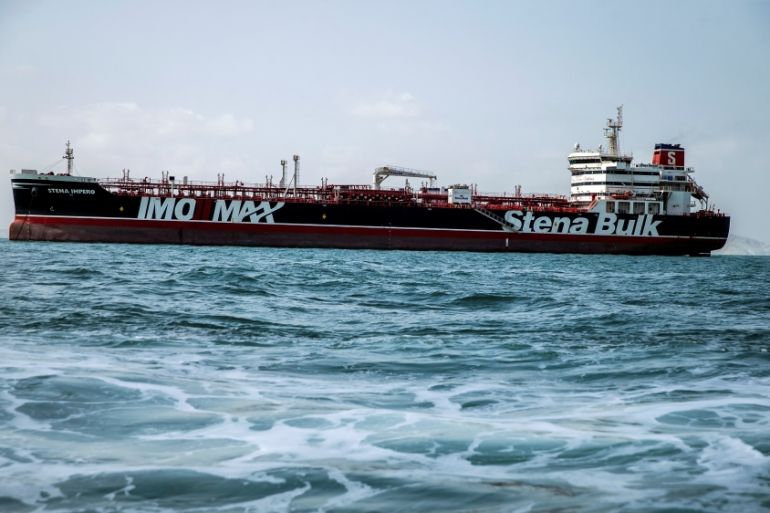Seized UK-flagged tanker Stena Impero leaves Iranian port
Stena Impero has set a new destination for Port Rashid in Dubai two months after it was seized in the Strait of Hormuz.

The British-flagged Stena Impero tanker detained by Iran has left the Bandar Abbas port and entered international waters two months after it was seized, according to an Iranian shipping organisation and the ship’s owner.
The Stena Impero was seized by Iran’s Revolutionary Guards in the Strait of Hormuz waterway for alleged marine violations two weeks after Britain seized an Iranian tanker off the territory of Gibraltar.
The raid saw commandos,carrying assault rifles, rappel down onto the vessel via helicopter in dramatic images later replayed on state television.
“The Stena Impero started sailing from the mooring towards the Persian Gulf’s international waters as of 9:00am [05:30 GMT] today,” Hormozgan province’s maritime organisation said on its website.
The Stena Impero has set a new destination for Port Rashid in Dubai in the United Arab Emirates (UAE), about 250 kilometres (155 miles) away, tracking data showed.
At normal tanker speed, it would reach that destination within half a day.
The ships owner, Stena Bulk CEO Erik Hanell, confirmed the ship had left Iranian waters and was bound for Dubai.
“It reached international waters,” Hanell said in a text message to Reuters news agency.
Iran had released seven crew members earlier in September. Sixteen crew members, mostly Indian nationals, stayed on board.
They were “safe and in high spirits” and arrangements have been made for them to return to their families upon arrival in Dubai, Hanell said in separate statement.
“The crew will have a period of time to be with their families following ten weeks of detainment on the vessel,” he added.
Iran said they seized the tanker in the Strait of Hormuz, through which 20 percent of the world’s oil passes, for alleged violations including turning off its tracking devices to avoid Iranian forces and colliding with a fishing boat, said Al Jazeera’s Assed Baig.
“Many people saw it as retaliation for the seizure of Iranian tanker off the coast of Gibraltar by British royal marines that had taken place two weeks earlier in July,” Baig said, speaking from Tehran.
The Iranian tanker, then called Grace 1, was carrying $130m in crude oil, which led authorities in Gibraltar to accuse Tehran “of violating European Union sanctions and saying that that tanker was on its way to deliver oil to the Syrian regime,” he continued.
“That Iranian tanker had been released in August but has since been seen off the coast of Syria,” Baig added.
Attempt to ease tensions
Responding to the Stena Impero’s release, UK Foreign Secretary Dominic Raab, reiterated the British position that the ship had been “unlawfully seized by Iran”.
He described the incident as “part of a pattern of attempts to disrupt freedom of navigation” in the region.
Al Jazeera correspondent Zein Basravi said the release of the vessel was planned ahead of the Iranian delegation’s attendence at the United Nations General Assembly gathering in New York.
“Anyone who has ever worked with Iranian bureaucracy knows it can be as complicated to navigate as the Strait of Hormuz itself,” he said, also speaking from Tehran.
“We’ve heard formal statements from the Iranian government, the foreign ministry as well as from the Iranian ambassador to the UK that have been coming out by way of press conferences and Twitter saying that the legal detention of this vessel had been lifted, and it was free to go,” he continued.
Basravi said that Iranian officials and “anyone calling for peace in the region” hope that the release of the Stena Impero will work as a “release valve”, but “there’s a long way to go to ease ongoing tensions between Iran and its neighbours, as well as between Iran and the US.”
Tit-for-tat attacks
Iran’s foreign ministry had said on Wednesday that a lifting of the detention order had been finalised, but that an investigation into the vessel was ongoing.
|
|
Later that day, Stena Bulk said it was not in negotiations with Iran and was not aware of any formal charges against the crew or the company.
The Stena Impero’s seizure on July 19 ratcheted up tensions in the region following tit-for-tat attacks in May and June on other merchant vessels in Gulf waters, which Washington blamed on Tehran. Iran has denied responsibility.
The US cobbled together a maritime coalition in the wake of those attacks on ships passing through the Gulf waters. The coalition currently includes the UK, Australia, the UAE and Saudi Arabia.
Relations between the United States and Iran have become more strained since Washington withdrew last year from a global pact to rein in Tehran’s nuclear programme and imposed sanctions on the country aimed at shutting down Iranian oil exports.